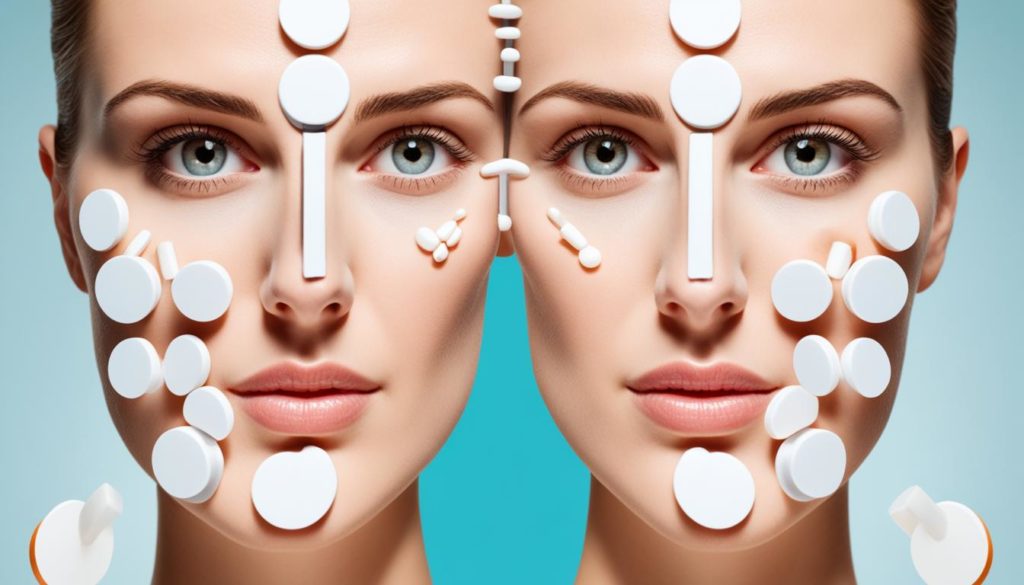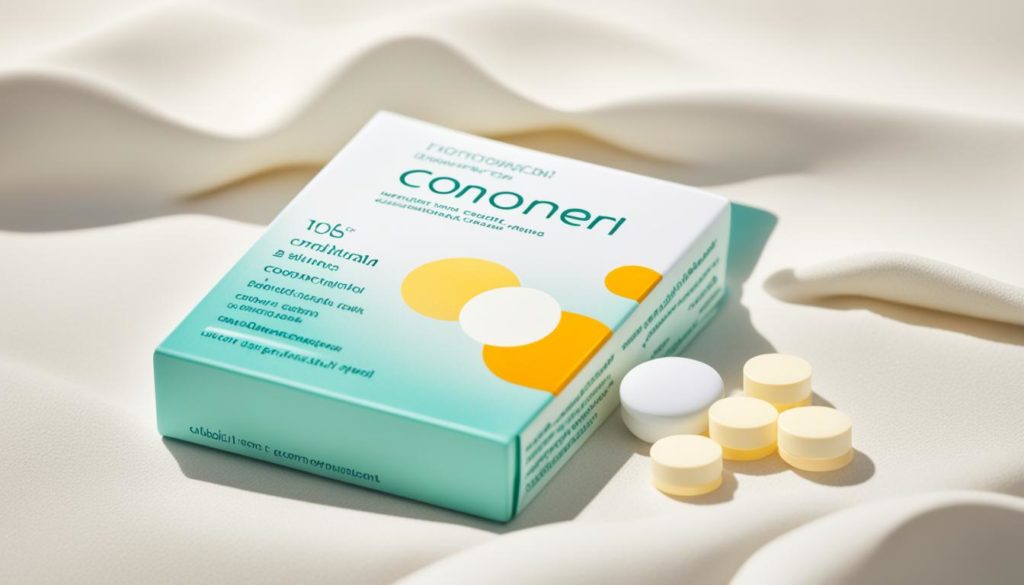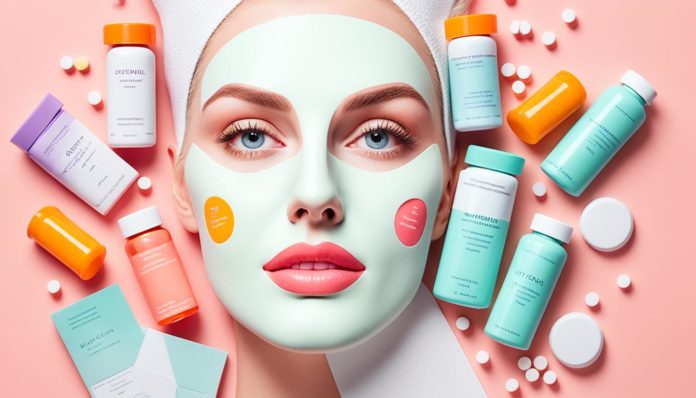About half of women aged 20 to 29 deal with adult acne caused by hormonal changes. Birth control for acne is a powerful option for those facing hormonal acne. It controls oil production, cuts down on swelling, and helps prevent acne.
Understanding how hormones affect skin health lets people find a specific way to keep their skin clear. With the right hormonal birth control, you can get a method that suits your skin’s needs.
Key Takeaways
- Hormonal birth control for acne can regulate sebum production.
- Acne management with birth control reduces skin inflammation.
- Selecting the right birth control can alleviate common acne issues.
- A targeted approach improves the clarity and health of your skin.
- Approximately 50% of women aged 20-29 suffer from hormonal acne.
Introduction to Birth Control for Acne
Using Birth Control for Acne could be key to getting clearer skin. It uses hormonal contraception to treat acne, helping many improve their skin. What does this method involve, and how does it reduce acne?
What is Birth Control for Acne?
Birth control for acne means using hormonal contraceptives to ease acne symptoms. These often mix estrogen and progestin, balancing hormones and cutting down sebum. Sebum is an oily substance that can block pores, causing acne. This approach is an effective alternative to traditional acne treatments.
How Birth Control Can Help with Acne
Hormonal contraception tackles the hormones that cause acne. High androgen levels make more oil, which clogs pores and causes breakouts. Birth control pills with estrogen and progestin correct this imbalance. They lesson sebum production and tame acne. These contraceptives also make menstrual cycles more regular, aiding in clearer skin.

Understanding Hormonal Birth Control and Acne
Hormones play a big part in the start of acne. In particular, androgens, a kind of hormone, really affect skin health. When androgens go up, they can make sebum increase. This sebum can clog pores and lead to acne.

The Role of Hormones in Acne
Getting to know the hormonal background is key in looking at acne and birth control pills. Androgens are male hormones found in both men and women. They can make sebaceous glands grow and produce too much oil. This excess oil can block pores and cause acne. So, using hormonal birth control for acne can help keep hormone levels even.
Types of Hormonal Contraceptives
There are various hormonal contraceptives to help with acne. Combined oral contraceptives have estrogen and progestin. They help even out hormone changes. Progestin-only pills have just progestin and help with acne too. Contraceptive patches release hormones through the skin. They help keep hormone levels steady.
- Combined Oral Contraceptives
- Progestin-Only Pills
- Contraceptive Patches
Each method has unique advantages for skin health. It’s important to understand how hormonal birth control can help with acne. Talking to a healthcare provider is key. They can help pick the best option based on individual hormone profiles and acne issues.
Benefits of Using Contraceptives for Acne Treatment
Contraceptives can really help those battling acne. One key benefit of contraceptives for acne is they lessen breakouts. They balance hormones, which reduces the number of pimples, giving you clearer skin.
These pills also make your skin smoother and nicer to touch. They do two things at once, so they’re super useful for treating acne. They even make periods more regular, helping you plan your skin care better.
| Type of Contraceptive | Benefits for Acne | Additional Advantages |
|---|---|---|
| Combined Oral Contraceptives | Reduces severity, frequency, and inflammation of acne lesions | Regulates menstrual cycle, decreases menstrual cramps |
| Progestin-Only Pills | Helpful in reducing acne for those sensitive to estrogen | Recommended for breastfeeding women, lower hormonal doses |
| Hormonal Injections | Effective in long-term acne management | Convenient, requires attention only every three months |
Using acne medication with birth control can change the game in skin care. Knowing which contraceptive works for your skin can create a great acne treatment plan. This shows the real value of contraceptives for acne.
Popular Birth Control Pills for Acne
Choosing the right birth control pill for treating acne can make a big difference for your skin. Some pills are FDA approved especially for acne treatment. They come with different benefits. Knowing about these can help you find the one that suits you the best.
Approved Birth Control Pills
The FDA has OK’d birth control pills like Ortho Tri-Cyclen, Estrostep, and Yaz for acne. These pills mix estrogen and progestin. This combo helps balance hormones and reduces acne. Let’s dive deeper into each option:
| Brand | Ingredients | Benefits |
|---|---|---|
| Ortho Tri-Cyclen | Ethinyl Estradiol/Norgestimate | Highly effective in reducing acne breakouts and regulating menstrual cycles. |
| Estrostep | Ethinyl Estradiol/Norethindrone Acetate | Beneficial for women with combination skin, targets both acne and oily complexion. |
| Yaz | Ethinyl Estradiol/Drospirenone | Helps to reduce severe acne while also addressing premenstrual dysphoric disorder (PMDD). |
Comparing Different Brands
It’s vital to look at the unique make-up of each acne birth control pill. Ortho Tri-Cyclen, Estrostep, and Yaz have their own estrogen and progestin mix. This means they work differently for everyone. Assessing these pills closely helps you pick the right one for your acne care and life.
How to Choose the Best Birth Control for Acne
To pick the right birth control for acne, look at your health history, how you react to hormones, and what you prefer. It’s critical to talk to a healthcare expert. This ensures the method you choose is right for you.
Consulting with a Dermatologist
A dermatologist is key in choosing birth control for acne. They assess your skin and suggest the best hormone-based birth control. Sharing your full health background and past treatments is vital for a tailored plan.
Evaluating Your Skin Type and Needs
The type of your skin and its unique needs affect your birth control choice for acne. Whether your skin is oily, dry, or a mix affects which hormone therapy might work best. Knowing how your skin changes with hormonal shifts helps in making a choice.
Potential Side Effects of Birth Control for Acne
Hormonal contraceptives are a common way to treat acne. But, they come with potential side effects. Knowing these risks before starting birth control for acne is crucial. Some may feel changes in mood. These can range from being a bit irritable to having bigger emotional swings. It’s important to watch your mental health during this time.
Weight gain is another side effect that some users notice. This can make some people want to stop using the birth control, even if it helps their acne. Eating well and staying active can help manage this problem.
Some women report breast tenderness when using birth control for acne. This discomfort can change but often gets better as the body adapts. There’s also a higher risk of blood clots, especially for people with certain health issues or smokers. This serious side effect makes it important to talk with a doctor and share your medical history before starting birth control.
A more detailed look at these potential side effects can be examined below:
| Side Effect | Description | Commonality |
|---|---|---|
| Mood Changes | Emotional fluctuations, irritability, anxiety | Moderate |
| Weight Gain | Increased body weight, may vary by individual | Common |
| Breast Tenderness | Sensitivity and pain in breast tissue | Common |
| Blood Clots | Increased risk of clotting, particularly in smokers | Rare, but serious |
It’s key to talk to a healthcare provider when considering birth control for acne. They can help you weigh the risks and pick the best option. Always discuss with your doctor to make sure your treatment is good for your skin and health overall.
Combining Birth Control with Other Acne Treatments
Using different acne treatments together can help women, especially those with hormonal issues. It makes a big difference in fighting acne.
Topical Treatments
Acne and birth control pills work well with topical treatments. Retinoids and benzoyl peroxide clear pores and soothe skin. They work better together, making skin look clearer.
Oral Medications
Some people use oral meds like antibiotics or isotretinoin with birth control for acne. These pills work from the inside. They cut down oil and germs. This makes birth control pills even more effective against acne.
Hormonal Treatments
Adding spironolactone to birth control pills is another strategy. It tackles acne caused by hormones. Together, they give a strong defense against acne by hitting it from all sides.
| Treatment Type | Function | Possible Combinations |
|---|---|---|
| Topical Treatments | Unclogs pores, reduces inflammation | Retinoids, Benzoyl Peroxide |
| Oral Medications | Targets acne from within | Antibiotics, Isotretinoin |
| Hormonal Treatments | Reduces androgen effect | Spironolactone |
Personal Stories and Testimonials
Learning from others’ experiences with contraceptives for acne can offer valuable insights. We’ve collected personal stories and testimonials. They show the path to clearer skin.
Shannon, a 28-year-old in marketing, fought hormonal acne for a long time. “I tried many remedies before talking to my dermatologist, who suggested birth control pills. It was a turning point! This method drastically improved my confidence and skin,” she said.
Similarly, Emily, a college student, found success with contraceptives for acne. “The decision to switch cleared my skin and balanced my menstrual cycle. It was beneficial in multiple ways,” she mentioned.
These stories shed light on the personalized approach to treating acne with contraceptives. The perfect solution varies from person to person. But, the outcome often boosts skin health and confidence.
Also, Jessica, who struggled with severe acne since her teens, saw a huge improvement with contraceptives. “Nothing worked for me until my doctor suggested birth control pills. I was doubtful, but thrilled by the quick clear-up of my skin,” she shared.
These accounts emphasize the significant advantages of contraceptives for acne. They showcase the varied experiences people have. Although finding the right birth control for acne differs, the goal of achieving clearer skin is common and usually achieved.
Scientific Studies on Birth Control and Acne
Recent studies have looked at how effective birth control methods are at treating acne in adult women. They have found that hormonal contraception can reduce the number and severity of acne lesions.
Important Research Findings
Research has concentrated on hormonal components such as drospirenone and ethinyl estradiol. Studies show that birth control pills with these ingredients are effective against acne. They lead to fewer acne lesions and smoother skin.
A detailed study showed the benefits of drospirenone and ethinyl estradiol for acne. It also looked at the safety and usability of contraceptive implants and long-term contraceptives in treating acne.
Expert Opinions
Experts stress the need to consider each person’s hormonal balance when choosing birth control for acne. Dermatologists often prescribe birth control pills based on the patient’s specific hormone levels and skin type. This tailored approach aims for the best treatment results and minimizes side effects.
| Study | Contraceptive Type | Results |
|---|---|---|
| Drospirenone & Ethinyl Estradiol Study | Combined Oral Contraceptives | Significant reduction in acne lesions |
| Long-Acting Reversible Contraceptives Study | Implants & IUDs | Improved acne management |
In conclusion, research and expert opinions support the use of hormonal contraception for acne treatment. This is seen as a promising approach.
Conclusion
Hormonal birth control is a powerful tool against acne. It works by tackling the hormonal imbalances that often lead to acne. We’ve covered the impact of birth control on acne, the role of hormones, and the available contraceptive options.
Using birth control for acne comes with many advantages. These range from choosing the right brand to knowing the possible side effects. It’s important to talk with a doctor and think about your skin type and health before deciding.
Birth control can also be part of a larger acne treatment plan. This might include creams, pills, or hormone therapy. We’ve seen real stories and studies that show how well this can work. With a doctor’s advice, you can find the best way forward for clear skin.
FAQ
What is Birth Control for Acne?
Birth Control for Acne is using hormonal contraceptives to help control acne. These contraceptives work by changing hormone levels, which can decrease the skin’s oil production. This helps stop acne from forming.
How can Birth Control help with Acne?
Birth control helps with acne by keeping hormone levels in check. It especially targets androgens that make sebum. Less oil means fewer acne breakouts.
What role do hormones play in acne development?
Androgens, a type of hormone, are key in causing acne. They increase oil production, leading to blocked pores and acne. Hormonal contraceptives balance these hormones, helping clear the skin.
What types of hormonal contraceptives are available?
There are many hormonal contraceptives like oral pills, patches, and rings. Each kind has different hormones and works in unique ways to treat acne.
What are the benefits of using contraceptives for acne treatment?
Using hormonal contraceptives for acne can reduce breakouts and smooth the skin. They also regulate periods, making skincare routines more effective.
Which are some of the popular birth control pills approved for acne?
Ortho Tri-Cyclen, Estrostep, and Yaz are popular pills for acne, approved by the FDA. Each has a special mix that meets various needs.
How should one choose the best birth control for acne?
To pick the best birth control, talk to a dermatologist. They’ll look at your skin, acne, and health history. It’s important to consider how your body reacts to hormones and your personal needs.
What are the potential side effects of using birth control for acne?
Birth control side effects include mood swings, weight gain, and sore breasts. There’s also a slight risk of blood clots. Always talk about these risks with a doctor before starting.
Can birth control be combined with other acne treatments?
Yes, you can use birth control with other acne treatments. This can include creams, pills, or hormonal therapies. Combining treatments can make them work better.
Are there any personal stories or testimonials about using birth control for acne?
Personal stories about using birth control for acne share real results and experiences. They show how people’s skin improved and their personal acne journeys.
What do scientific studies say about birth control and acne?
Studies show birth control can greatly cut down on acne. Experts say understanding your hormone profile helps predict how well the treatment will work for you.


